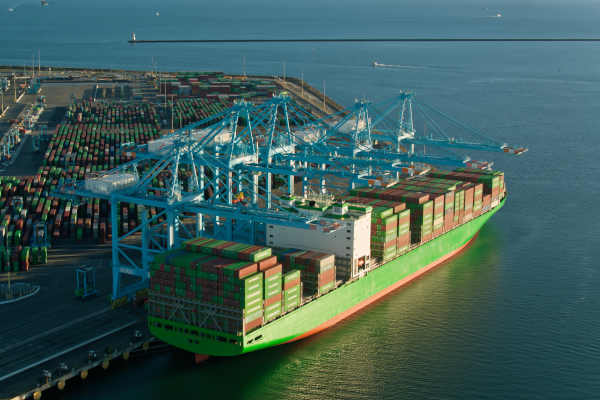U.S. retailers expect import growth through the first half of 2024 despite continued delays at the Suez Canal and terrorist attacks on ships in the Red Seas, according to the Global Port Tracker report released by the National Retail Federation and Hackett Associates.
The Global Port Tracker (GPT) predicts U.S. imports will increase 20.4% year-over-year in February compared to the 13.8% increase predicted in last month’s report. The tracker also increased the year-on-year gains for March (up 5.5% vs. 4.7%), April (up 2.6% vs. 0.2%), and May (up 0.3% vs. a decline of 0.8%).
About 12% of U.S.-bound cargo comes through the Suez Canal, and while the impacts will continue to bring volatility and uncertainty to supply chains, NRF Vice President for Supply Chain and Customs Policy Jonathon Gold said U.S. retailers are working to mitigate these impacts and increased costs.
He adds that the longer the disruptions occur, however, the bigger the impacts could be.
“More needs to be done among partners and allies to ensure the safety of vessels and crews in order to avoid yet another year of supply chain disruption,” said Gold.
Mitigation strategies at play
One strategy carriers have adopted is using a surplus of capacity built up during the pandemic to ease the impact as voyages are diverted around the Cape of Good Hope or to the U.S. West Coast.
“The shipping industry has rapidly adjusted by adding extra vessels to its networks, and has returned to normal weekly ship arrivals,” said Hackett Associates Founder Ben Hackett. “Service from Asia to the U.S. East Coast is working well, and the dramatic rise in freight rates is showing signs of easing, with pressure from shippers likely to quickly bring these down.”
In prepared testimony for the House Subcommittee on Coast Guard and Maritime Transportation, Gold said NRF members are also encouraging earlier shipments, working with overseas suppliers to ensure back-to-school and holiday shipments.
In addition to rerouting shipments, some retailers are shifting to air cargo for more sensitive and timely shipments. Air cargo volume and rates from China surged in the final week before Lunar New Year, but Cathy Morrow Roberson reports in her Freight Forward newsletter that “there is still no clear differentiation between seasonal demand and a Red Sea-driven shift from ocean.”
Questions arise around rising freight rates
While many retailers and other shippers are still under their yearly ocean contract and can work with the carriers on rate increases and surcharges, retailers are now entering the cycle for new contract negotiations. Gold said many NRF members are concerned about the impact of long-term disruption on the next ocean freight contract.
In testimony before the Federal Maritime Commission (FMC), Retail Industry Leaders Association (RILA) Director of Supply Chain Policy Sarah Gilmore urged the FMS to reconsider price increases from carriers.
“Questions persist regarding the direct correlation between surcharges and the tangible costs associated with avoiding the Red Sea,” said Gilmore. “Taken together, if the Red Sea crisis persists for six months, the cumulative effect of surcharges is projected to result in tens of millions of additional costs for retailers.”
Gold added in separate testimony that “while many are focusing on the current impacts of the disruptions, the longer the attacks and disruptions continue, the more challenges that will be created. We believe the federal government needs to start paying attention to these issues now to help avoid significant congestion in the coming months.”
SC
MR


More 3PL
- Orchestration: The Future of Supply Chain
- February and year-to-date U.S. import volume is solid, reports S&P Global Market Intelligence
- 2024 retail sales forecast calls for growth, says National Retail Federation
- ISM reports another month of services sector growth in February
- February manufacturing output declines, notes ISM
- How to Create Real Retailer-Brand Loyalty
- More 3PL
Latest Podcast

 Explore
Explore
Topics
Procurement & Sourcing News
- Israel, Ukraine aid package to increase pressure on aerospace and defense supply chains
- How CPG brands can deliver on supplier diversity promises
- How S&OP provides the answer to in-demand products
- There is still work to do to achieve supply chain stability
- Blooming success: The vital role of S&OE in nurturing global supply chains
- How one small part held up shipments of thousands of autos
- More Procurement & Sourcing
Latest Procurement & Sourcing Resources

Subscribe

Supply Chain Management Review delivers the best industry content.

Editors’ Picks




